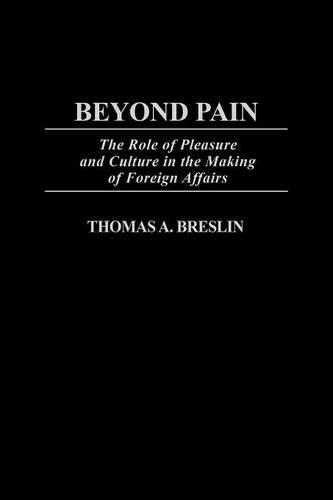
Beyond Pain: The Role of Pleasure and Culture in the Making of Foreign Affairs
(Hardback)
Available Formats
Publishing Details
Beyond Pain: The Role of Pleasure and Culture in the Making of Foreign Affairs
By (Author) Thomas A. Breslin
Bloomsbury Publishing PLC
Praeger Publishers Inc
30th October 2001
United States
Classifications
Tertiary Education
Non Fiction
Social and cultural anthropology
327.101
Physical Properties
Hardback
216
Description
Breslin demonstates that, for two millennia, states in East Asia, Europe, and America have successfully used pleasure to protect themselves and advance their interests, at a small fraction of the cost of militarized policies. Indeed, the Chinese demonstrated that pleasure-based policies primed a stream of highy profitable foreign trade and bolstered the state. Pleasure was feared because it was effective as both an offensive and defensive strategy. The colleens of Ireland and the bibis of India showed how inexorably effective pleasure could be in confounding militarily stronger invaders. In contrast, resorting to violence and pain generally undermined aggressive states. Cultural factors have shaped the choice of pleasures used. Food-centered China has used food, as well as sex and tourism, as tools in its foreign relations. Rome used wine; Byzantium, precious metals, banquets, and public spectacles; Venice, sex, money, and art; England, money and education. America has used sex, money, education, music, and tourism. Breslin's provocative text is based on a wide reading of secondary sources and some primary sources as well as a quarter century of teaching the history of foreign relations.
Reviews
Breslin should be applauded for his willingness to ask bold questions and to cross disciplinary boundaries in an effort to fathom the complexities of human and state power throughout history.-Journal of Interdisciplinary History
General readers and lower-division undergraduates.-CHOICE
This intriguinly titled book contains much fascinating information culled from various periods and events of world history...it offers a useful antidote to the still predominantly power-oriented writings on international affairs. Because food, wine, sex and bribes are not the usual staple of diplomatic historians, Breslin reminds them that without taking these factors into consideration, the study of international relations would remain incomplete. If read in conjunction with more traditional accounts of diplomacy such as Harold Nicolson's Dimplomacy(1939), the book would provide an important insight into the variety of ways in which nations and peoples throughout the world have dealt with one antoher over the centuries.-International History Review
"Breslin should be applauded for his willingness to ask bold questions and to cross disciplinary boundaries in an effort to fathom the complexities of human and state power throughout history."-Journal of Interdisciplinary History
"General readers and lower-division undergraduates."-CHOICE
"This intriguinly titled book contains much fascinating information culled from various periods and events of world history...it offers a useful antidote to the still predominantly power-oriented writings on international affairs. Because food, wine, sex and bribes are not the usual staple of diplomatic historians, Breslin reminds them that without taking these factors into consideration, the study of international relations would remain incomplete. If read in conjunction with more traditional accounts of diplomacy such as Harold Nicolson's Dimplomacy(1939), the book would provide an important insight into the variety of ways in which nations and peoples throughout the world have dealt with one antoher over the centuries."-International History Review
Author Bio
THOMAS A. BRESLIN is Vice President for Research and Associate Professor of International Relations at Florida International University. Professor Breslin has published three earlier books and numerous articles in scholarly journals.
